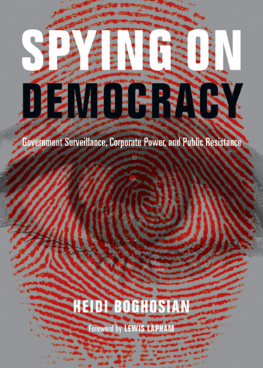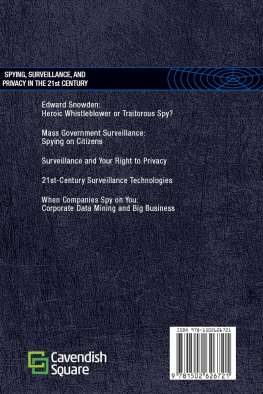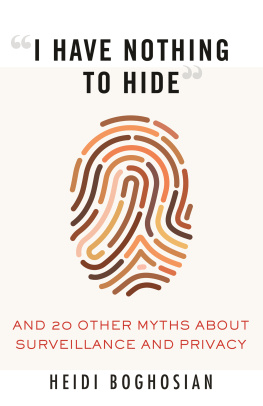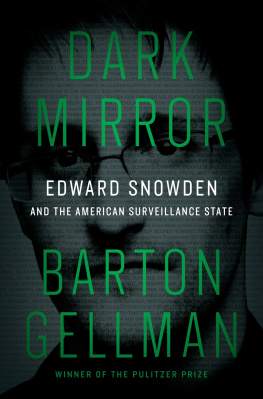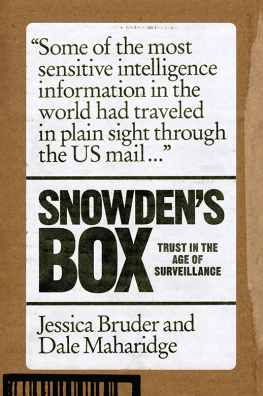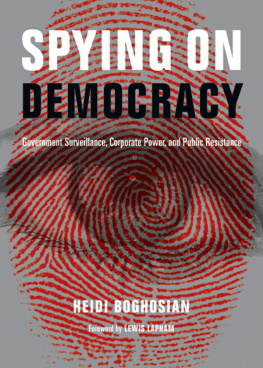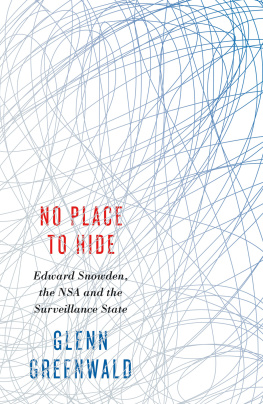ADVANCE PRAISE FOR SPYING ON DEMOCRACY BY HEIDI BOGHOSIAN
Modern life has a way of making us forget the deep political power of privacy. Spying on Democracy shakes that complacency, explaining how journalists, attorneys, political dissidents, religious groups, even children, are subject to ever new forms of surveillance in the name of convenience, marketing, and security. This books great contribution is to remind us how government and private-sector control over information can have shocking implications for freedom and democracy.
Alexandra Natapoff, author of Snitching: Criminal
Informants and the Erosion of American Justice
Heidi Boghosians Spying on Democracy is the answer to the question If youre not doing anything wrong, why should you care if someones watching you? Its chock full of stories about how innocent peoples lives were turned upside-down by public and private sector surveillance programs. But more importantly, it shows how this unrestrained spying is inevitably used to suppress the most essential tools of democracy: the press, political activists, civil rights advocates and conscientious insiders who blow the whistle on corporate malfeasance and government abuse.
Michael German, former FBI agent and ACLU
senior policy counsel
Its about time someone reverses the spy lens and exposes the corporations and government agencies behind a new wave of surveillance. In Spying on Democracy, Heidi Boghosian draws on her extensive legal and activist experience to document a web of surveillance stretching between private industry and the state. Its a chronicle of rogue spy operations, but its also a damning indictment of how our privacy rights are violated in ways that are shockingly legal. The material here is unsettling, but Boghosians message is not that we should attempt to hide in the shadows; its that we must be out front, loud, and on the side of the journalists and dissidents whose rights are most threatened.
Will Potter, author of Green Is the New Red: An
Insiders Account of a Social Movement under Siege
Spying on Democracy puts a laser focus on a challenge faced by millions of Americans who, like me, took a solemn oath to defend the Constitution against all enemies, foreign and domestic. What does that oath require of us now, as most of our co-citizens nod an acquiescent yes when New York Mayor Bloomberg (of stop-and-frisk fame) tells us that, after the Boston bombing, our interpretation of the Constitution has to change?
The nave but-Ive-got-nothing-to-hide reaction betrays how little most Americans know of history, and how willing they are to watch our Constitution shredded, as though from a box at the theater. That is how Raimund Pretzel, a young German lawyer described (in his autobiographical book, Defying Hitler) the reaction in Germany after the parliament was burned down in 1933. It was Germanys 9/11, so to speak, after which (and youve heard the words a thousand times) everything changed!
Pretzel was there in Berlin to describe what he called the collective, limp collapse... the nervous breakdown of the German people:
There are few things as odd as the calm, superior indifference with which we watched the beginnings of the Nazi revolution.... With sheepish submissiveness, the German people accepted that, as a result of the fire, each one of them lost what little personal freedom and dignity was guaranteed by the constitution, as though it followed as a necessary consequence. No one saw anything out of the ordinary in the fact that, from now on, ones telephone would be tapped, ones letters opened, and ones desk might be broken into.
Are we now Back to the Future? Grateful applause for another young lawyer with the guts to tell it like it is. Lets hope Americans will read Heidi Boghosians Spying on Democracy and learn from it. For, as Dr. King put it, There is such a thing as too late.
Raymond McGovern, Veteran Intelligence
Professionals for Sanity
SPYING ON
DEMOCRACY
Government Surveillance,
Corporate Power,
and Public Resistance
Heidi Boghosian
Foreword by Lewis Lapham

Open Media Series | City Lights Books
San Francisco
Copyright 2013 by Heidi Boghosian
Foreword Copyright 2013 by Lewis Lapham
All Rights Reserved
Cover design by Malcolm Grear Designers
Library of Congress Cataloging-in-Publication Data on file
ISBN: 978-0-87286-599-0
eISBN: 978-0-87286-603-4
City Lights Books are published at the City Lights Bookstore,
261 Columbus Avenue,
San Francisco, CA 94133.
www.citylights.com
The First Amendment was designed to allow rebellion to remain as our heritage. The Constitution was designed to keep government off the backs of the people. The Bill of Rights was added to keep the precincts of belief and expression, of the press, of political and social activities free from surveillance. The Bill of Rights was designed to keep agents of government and official eavesdroppers away from assemblies of people.
From Justice William O. Douglass
dissenting opinion (with Justice Thurgood
Marshall concurring) in Laird v. Tatum,
408 U.S. 1 (1972)
Contents
Acknowledgments
Friends and colleagues at the National Lawyers Guild are a constant source of inspiration. Many individuals gave feedback, including Lesley Alderman, Geoff Brady, Nora Eisenberg, Johanna Fernandez, Kris Hermes, Sarah Hogarth, Karen Menge, Rachel Rosnick, and Liz Templeton. Dan Gregors assistance was invaluable.
My editor Greg Ruggiero taught me that a narrative needs more than just the facts. From our first conversation aboard a train to Washington, D.C., his guidance has been gracious, his encouragement generous.
Marilyn and Varujan Boghosian appreciated the influence of corporations and the power of individual action as I learned after an incident involving a locked chain and the door of an unprincipled insurance company. Alice Wolff abetted an early fascination with spying.
Some books have ghostwriters. This one had a ghost thinker. Bill DiPaolas unstinting contributions of ideas and analysis about government and corporate surveillance were instrumental in shaping this compendium. I deeply appreciate his insights and ongoing collaboration.
FOREWORD
by Lewis Lapham
They that can give up essential liberty to obtain a little temporary safety deserve neither liberty nor safety.
Benjamin Franklin
The evidence gathered by Heidi Boghosian on the following pages attests to the pathology of an American government so frightened by its own citizens that it classifies them as probable enemies. Suspicious of all forms of unlicensed expression, the custodians of the nations conscience find the practice of democracy to be both uncivil and unsafe. Entirely too many people in the room or the parking lot who dont do what theyre told, dont swallow their prescribed daily dosages of the think-tank swill slopped into their bowls by the wardens of the corporate security state.
Such people present the risk of having thoughts of their own, and therefore they must be carefully and constantly watched. How constantly and how carefully is the lesson embedded in Spying on Democracy. Before reading the book I knew that over the last fifty years the U.S. government had been stepping up its scrutiny of a populace that it chooses to regard as a mob. I had yet to appreciate the extent to which the computers have been programmed with the mind of a lunatic conspiracy theorist.

